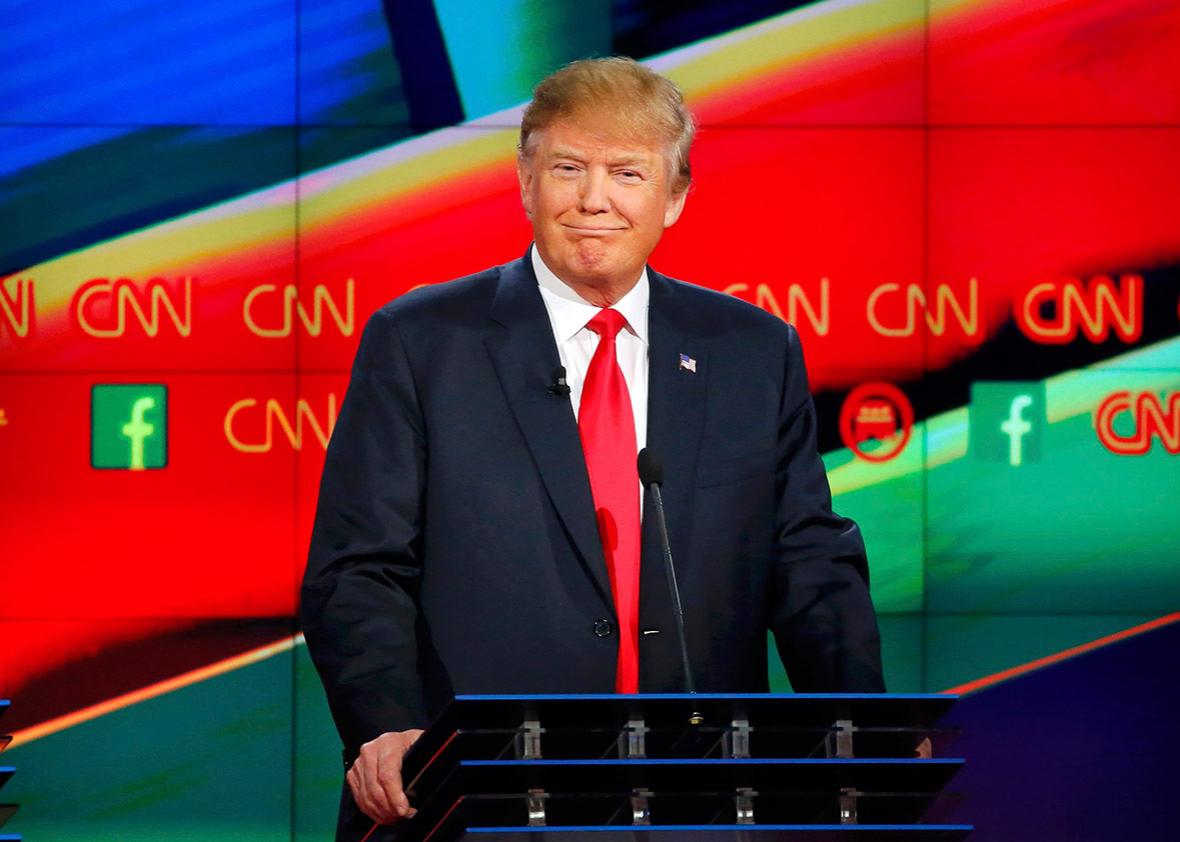The first question of the night at the CNN debate was, no surprise, about Donald Trump’s Muslim ban proposal. “Look, this is not a serious proposal,” Jeb Bush said in the harshest criticism in the early minutes of the debate. “Donald is great at the one liners, but he’s a chaos candidate, and he’d be a chaos president.” Trump’s proposal came in for harsher criticism in the undercard debate, with George Pataki calling it “unamerican” and “unconstitutional,” and Lindsey Graham warning that it will make the country less safe. But in the primetime show, Marco Rubio, Ted Cruz, and Carly Fiorina could barely bring themselves to critique their party’s frontrunner. Perhaps that’s because Trump has simply taken their conservative dog whistle and replaced it with a bullhorn.
In the immediate wake of last month’s terror attacks in Paris—weeks before Trump uttered the words “total and complete shutdown”—Jeb Bush and others were calling for a similar (and similarly short-sighted) type of no-Muslims religious test for Syrian refugees looking to resettle in the United States. That effort stalled on Capitol Hill, but the GOP-controlled House—with the blessing of GOP hopefuls like Chris Christie—still passed legislation effectively affirming Trump’s unsupported claim that Syrian refugees were an ISIS “Trojan Horse.” Ben Carson previously proposed his own religious test for future presidents (and has also likened Syrian refugees to “rabid dogs”). Ted Cruz, meanwhile, has inched closer to Trump than anyone else in the field, making it clear that he’s by no means offended by the no-Muslims-allowed plan and going to his own great lengths to blur the line between Muslims and Islamic extremists.
The common conservative refrain on the campaign trail has long been that the first step in fighting ISIS is to define it as “radical Islamic terrorism”—a faux-taxonomy the candidates have no interest in using when the subject is terrorist attacks committed by Christians. The GOP field, then, is already on the record that they believe the Islamic faith itself poses a unique threat to the United States, and Trump’s proposal is just the sad logical conclusion to that illogical fearmongering.
The GOP’s xenophobia hasn’t been reserved only for Muslims, either. It was a similar story following Trump’s rambling, anti-immigrant rant that launched his campaign. Despite the GOP establishment’s well-documented fear about alienating Hispanic voters as Mitt Romney did four years ago when he said the words “self-deportation,” Trump’s ostensibly more sober-minded rivals were willing to entertain ideas like building a 1,989-mile wall along the Mexican border and tracking foreigners like they’re FedEx packages. Even Jeb Bush, a man who only a year earlier described coming to the United States illegally as “an act of love” people undertook for their families, began using the derogatory term “anchor babies” while his party talked openly about repealing the 14thamendment.
Republicans tonight seem unwilling to abandon the worldview that underpins Trump’s proposals—and equally unwiling to confront their own voters who share that view and support such proposals. Each and every Republican in the 2016 field has pledged his or her support to the eventual nominee, and none have had the courage to say that Trump’s proposal changes that. As Graham put it during Tuesday’s first debate: “The bottom line: If it’s Trump, so be it. That’s who I’ll support.”
